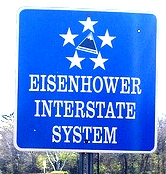On net neutrality: What if Eisenhower had asked private industry to build our Interstates?
We’ve been digesting and thinking about yesterday’s Google/Verizon statement about how to build out fast Internet for America — and trying to think of analogies that put the issue in terms non-geeks can understand. Over at the Mountain Area Information Network, Wally Bowen draws an excellent analogy to British property. Also, Susan Crawford at NYU’s Cardoza law school (who just spent a year in the Obama White House) has a non-hyperbolic reaction.

Note in Monday’s Google-Verizon statement (TEXT or Reuters account) they say their first priority is network neutrality and their second is to ensure capital will be available to build out connectivity.
Consider what would have happened if, when he began the Interstate Highway System, President Dwight D. Eisenhower (a Republican) had said: “We’re going to ask private industry to build our superhighways.“
The result surely would have been a network of tollways all across the country. And in fact, many modern freeways are now tollways because government won’t step up to the plate to pay for them as a public good.
But there is a countervailing argument around roads and that is that people should pay for their actual usage — especially the trucking industry.
Apply that analogy to the “Information Superhighway.” The reason Verizon wants wireless unregulated is so they can finance the buildout with special fees — tolls. And charge heavy commercial users — analogous to trucks paying tolls.
So, we have a decision to make as a nation — is the Information Superhighway going to be funded by user fees that discourage broad public usage, or are they going to be funded in a broad-based manner — either taxes or universal fees (such as ISP fees)? Or is their a middle ground — a way to charge commercial users only — like the truckers? Can we have “parkways” that exclude commercial users so that the ride is smooth and fast?
It’s not a completely open-shut debate. I’m inclined for the moment to argue that when it comes to information — the lifeblood of democracy — a tollway-based system doesn’t make sense. Nor does it make sense for or core information infrastructure to be in private hands. That would be analagous to our expressways being owned by corporations — with the right to control who can access them, and when, and the ability to block their competitors from doing so.
Also, where there are road tollways, there are still other routes you can take, slower, more scenic. Can we make certain somehow in a “tolled” Internet that there is a base service for everyone that is of high quality? Especially, for example, libraries — the community information centers of last resort for people who can’t afford tolls.
We’ve already allowed the Internet in this country to develop largely as a privately owned space. Eisenhower would have understood how this could happen — remember his prophetic Jan. 16, 1961 speech about the military-industry complex? What we must now to do is assert its value as a public good, and tell the owners of it that they must respond to the information needs of our democracy. If that means they need help — money — creating a world-class web infrastructure as a tradeoff to giving up the ability to control who rides the roads, that may be the choice we have to make — just as we did in the Eisenhower era.
Other voices
- Craig Aaron, of the lobby group FreePress.net
- Jeff Jarvis of City University of New York (includes other links)
- Tom Foremski on the silence of Vint Cerf, the “father of TCP/IP”
- The Electronic Frontier Foundation’s analysis of the Google/Verizon proposals
